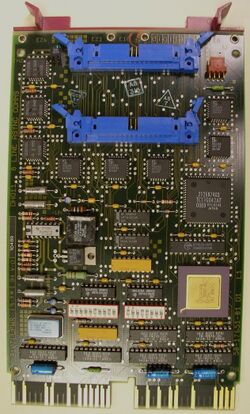DHQ11 asynchronous serial line interface
The DHQ11 asynchronous serial line interface is the second QBUS equivalent to the UNIBUS DH11 (it is a replacement for the DHV11). It provided 8 RS-232 asynchronous serial lines. Output used DMA (with each line having its own buffer pointer and count); input used a 256-character FIFO buffer.
It can be set (via a switch) to exactly emulate either a DHV11 or DHU11.
Implementation
Physically, the DHQ11 consisted of a single dual card, the M3107, connected to a pair of H3173-A distribution panels (4 lines each) via a BC05L flat cable, one per distribution panel; the BC05L connects to a 40-pin Berg header on each end. The H3173-A can be recognized by the DEC part number 50-15588-01 or -02 on its PCB; each contains four male DB-25 connectors (DB-25P). In addition to the usual '-xx' length indicators on the BC05L cable, it was also available in BC05L-1K (21 inch) and BC05L-2F (30 inch) lengths.
Device registers
The registers will depend on whether it is emulating a DHV11 or DHU11.
Control and Status Register (CSR)
In DHU11 mode, the CSR is:
| TXA | TXIE | DF | TDE | Unused | Tx Line | RDA | RXIE | MR | SKIP | Unused | Line | ||||
| 15 | 14 | 13 | 12 | 11 | 10 | 09 | 08 | 07 | 06 | 05 | 04 | 03 | 02 | 01 | 00 |
- TXA - Transmitter Action
- TXIE - Transmit Interrupt Enable
- DF - Diagnostic Fail
- TDE - Transmit DMA Error
- Tx Line - Line which set TXA
- RDA - Received Data Available
- RXIE - Receive Interrupt Enable
- MR - Master Reset
- SKIP - Skip Self-Test
- Line - Select TXC through TBCT
External links
- DHQ11 User Guide (EK-DHQ11-UG.002)
- DHQ11 Technical Manual (EK-DHQ11-TM-01)
- Field Maintenance Print Set (MP02380)
- DHQ11 Notes
